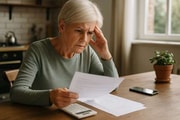Are you at risk? Exotic disease-carrying insects could be breeding at THIS Aussie airport!
By
Danielle F.
- Replies 4
Australia is renowned for its unique wildlife and ecosystems, but not all creatures buzzing around are welcome, especially those that carry exotic diseases. A recent discovery has raised concerns about the potential for deadly mosquitoes to breed at an Australian airport, putting the health of travelers and residents at risk.
The underground drainage system at Brisbane International Airport has been identified as a potential breeding ground for invasive mosquito species capable of transmitting life-threatening diseases such as dengue fever, chikungunya, and Zika virus. These diseases are not to be taken lightly, as they can have severe health implications, and in some cases, can be fatal.
Federal authorities are taking this threat seriously and have initiated trials of specialized traps around the airport to monitor and capture these mosquitoes. The Department of Agriculture's experts are on high alert, tracking down environments where larvae of the Asian tiger and yellow-fever mosquitoes could flourish.
Beth Cookson, the department's acting deputy secretary of biosecurity, highlighted the urgency of the situation. 'They typically enter Australia via baggage and cargo containers carried in aircraft arriving from overseas and can potentially breed in the vicinity of airports,' she explained. 'We are working hard to ensure they do not become established in these border areas.'
The traps being used, known as Hamer traps, were originally developed in the United States to combat the spread of the West Nile virus. They have proven effective in capturing native Australian mosquitoes, which gives experts hope that they will serve as a reliable surveillance measure for detecting exotic species.
The risk of these exotic mosquitoes becoming established in Australia is exacerbated by climate change, which is creating warmer weather conditions favorable for these pests. Dr. Cameron Webb, a mosquito expert from the University of Sydney, warned of the potential consequences: 'Once you've got these mosquitoes in your cities, towns, or suburbs, they are kind of like the tinder in the forest just waiting for that spark of an infected traveler to trigger an outbreak.'
Currently, the dengue fever virus is not established on mainland Australia, but the presence of these mosquitoes could change that. It's a situation that requires vigilance and proactive measures to prevent a public health crisis.
For our readers, especially those living near or traveling through Brisbane International Airport, it's essential to be aware of this situation. While the authorities are doing their part, individuals can also take steps to protect themselves. This includes using insect repellent, wearing long-sleeved clothing, and being cautious around stagnant water where mosquitoes breed.
We at the Seniors Discount Club urge you to stay informed and take the necessary precautions to keep yourselves safe from these potential threats. Remember, prevention is always better than cure, and in this case, it could be crucial in stopping the spread of exotic diseases.

Have you noticed an increase in mosquito activity in your area? Are you concerned about the potential health risks these insects pose? Share your thoughts and experiences with us in the comments below. Let's stay informed and look out for one another in our wonderful, albeit sometimes wild, Australian environment.
The underground drainage system at Brisbane International Airport has been identified as a potential breeding ground for invasive mosquito species capable of transmitting life-threatening diseases such as dengue fever, chikungunya, and Zika virus. These diseases are not to be taken lightly, as they can have severe health implications, and in some cases, can be fatal.
Federal authorities are taking this threat seriously and have initiated trials of specialized traps around the airport to monitor and capture these mosquitoes. The Department of Agriculture's experts are on high alert, tracking down environments where larvae of the Asian tiger and yellow-fever mosquitoes could flourish.
Beth Cookson, the department's acting deputy secretary of biosecurity, highlighted the urgency of the situation. 'They typically enter Australia via baggage and cargo containers carried in aircraft arriving from overseas and can potentially breed in the vicinity of airports,' she explained. 'We are working hard to ensure they do not become established in these border areas.'
The traps being used, known as Hamer traps, were originally developed in the United States to combat the spread of the West Nile virus. They have proven effective in capturing native Australian mosquitoes, which gives experts hope that they will serve as a reliable surveillance measure for detecting exotic species.
The risk of these exotic mosquitoes becoming established in Australia is exacerbated by climate change, which is creating warmer weather conditions favorable for these pests. Dr. Cameron Webb, a mosquito expert from the University of Sydney, warned of the potential consequences: 'Once you've got these mosquitoes in your cities, towns, or suburbs, they are kind of like the tinder in the forest just waiting for that spark of an infected traveler to trigger an outbreak.'
Currently, the dengue fever virus is not established on mainland Australia, but the presence of these mosquitoes could change that. It's a situation that requires vigilance and proactive measures to prevent a public health crisis.
For our readers, especially those living near or traveling through Brisbane International Airport, it's essential to be aware of this situation. While the authorities are doing their part, individuals can also take steps to protect themselves. This includes using insect repellent, wearing long-sleeved clothing, and being cautious around stagnant water where mosquitoes breed.
We at the Seniors Discount Club urge you to stay informed and take the necessary precautions to keep yourselves safe from these potential threats. Remember, prevention is always better than cure, and in this case, it could be crucial in stopping the spread of exotic diseases.
Key Takeaways
- An underground drain at Brisbane International Airport has been identified as a potential breeding ground for exotic disease-carrying mosquitoes.
- The Department of Agriculture is trialling specialised traps around the airport to monitor and prevent the spread of these insects.
- Exotic mosquitoes such as the Asian tiger and yellow-fever mosquitoes can carry life-threatening diseases, and efforts are being made to ensure they do not become established near Australian borders.
- Climate change could lead to conditions that allow exotic mosquitoes to thrive in Australia, raising concerns about potential local outbreaks of diseases like dengue fever.








